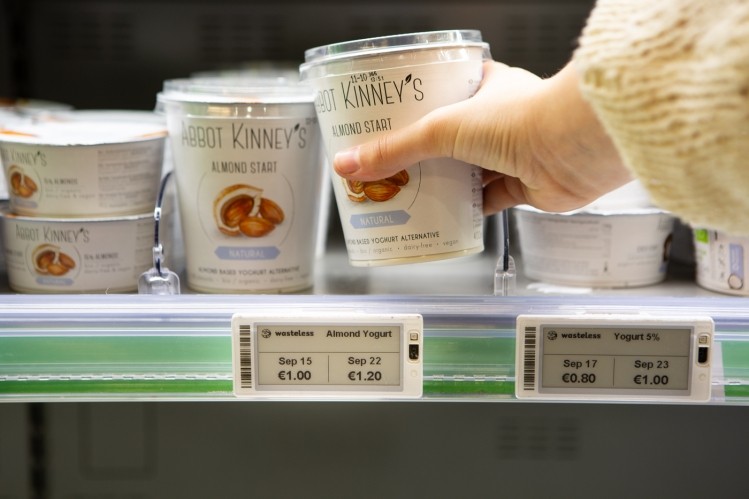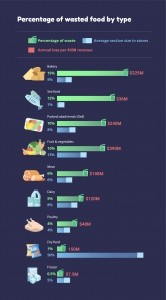‘We will wonder why perishables ever had constant prices in the first place’: AI firm Wasteless on why dynamic pricing is key in the fight against food waste

The company, which expects to be operating in up to 300 stores in Europe by the end of the year, claims the near 40% reduction amounts to hundreds of millions of dollars in additional profits for the average supermarket chain and a significant environmental relief. Food waste can cost an average retail chain more than $900 million annually, the start-up claimed.
The statistics relating to the environmental damage of food waste are now common reading, with Wasteless, which was founded in in 2016 backed by $6M in seed funding led by Slingshot Ventures and SOSV, claiming these problems are active and growing. One third of all the food we produce globally is wasted and represents around 7% of all greenhouse gas emissions, making it the third largest single emitter. If food waste was a country, it would be third behind the US and China as a producer of greenhouse gases.
Wasteless is tackling the problem by promising to change the way that consumers shop for anything that has an expiration date. Via an AI-powered pricing engine, Wasteless sets the prices of perishables, lowering prices automatically as items near expiration dates. This offers cash-saving incentives to consumers, while allowing stores to sell food that normally gets thrown out, boosting their revenues, as well as saving money on operating costs and labour. “In the future, this type of pricing will seem obvious to us, and ‘we will wonder why perishables ever had ‘constant' prices in the first place,” Wasteless CEO Oded Omer told FoodNavigator.
“Say you buy six eggs for breakfast tomorrow from a Wasteless-enabled store. There’s no reason to pay extra for a longer shelf life, so you could save a bit of money and feel good about keeping one more thing out of the landfill. The store manager is thrilled about the sale and the fact that the store’s garbage duty just got reduced a bit too. These little bits add up to something much bigger, literally truckloads of garbage.”
Cracking the code on food waste
After conducting proof-of-concept and pilot projects at chains that operate hundreds of stores across Europe, Wasteless is reporting a 39% decrease in food waste, as well as a 1.2% average increase in profit margins.
If a typical retailer has around 100 stores with around 100 different SKUs for perishables, then Wasteless claims its technology
- Reduces carbon emissions by 1,900 tonnes
- Saves 750 tonnes of waste from the landfill
- Rescues 3 million meals, enough to feed 4,200 people
- Saves 3.5 billion liters of water
- Recovers and sells 2.2 million products by applying dynamic markdowns
Wasteless integrates its technology with existing sales systems, introducing barcodes as well as electronic shelf labels for all perishables. Consumers are offered additional price points as a product gets nearer its expiration date, effectively eliminating the “hunt-for-freshest” shopping habits. Retailers benefit from Wasteless taking the guesswork out of markdowns and reducing the labor involved with inventory control. The Wasteless system also automates pricing updates on the shelf, within retailer apps, and at checkout.
"It doesn’t make sense that consumers will pay the same price for, for example, a sirloin steak that is expiring in two days or six days,” said Omer. Neither does it help retailers who face costly markdowns when waiting until the last minute to reduce the price of soon-to-expire items: by starting the mark downs earlier means they are less steep.
He said the tech has another advantage by way of giving people more options to buy premium produce they might not otherwise be able to afford to buy. But why can't retailers do all this themselves? "Retailers are retailers. They are not tech companies. They don't know how to develop code and AI and they often don't like to own this technology because they don’t have the staff to deal with it. This is just too much for them."
He added that the Wasteless AI markdown tool is used on 4-5% of the supermarket assortments and is initially focussed on meat products, packed salads and ready-meals, which offer the most economical value for retailers.
He further added that incentivising consumers and retailers is key in reducing the problem of waste. “Food waste represents 7% of all greenhouse gas emissions and is growing. We know that waste costs money and we know that we must incentive consumers and retailers somehow. We should incentivise consumers to pick up an older item and we should incentivise retailers to embrace the solution. Current waste drivers are not sufficient.”


























